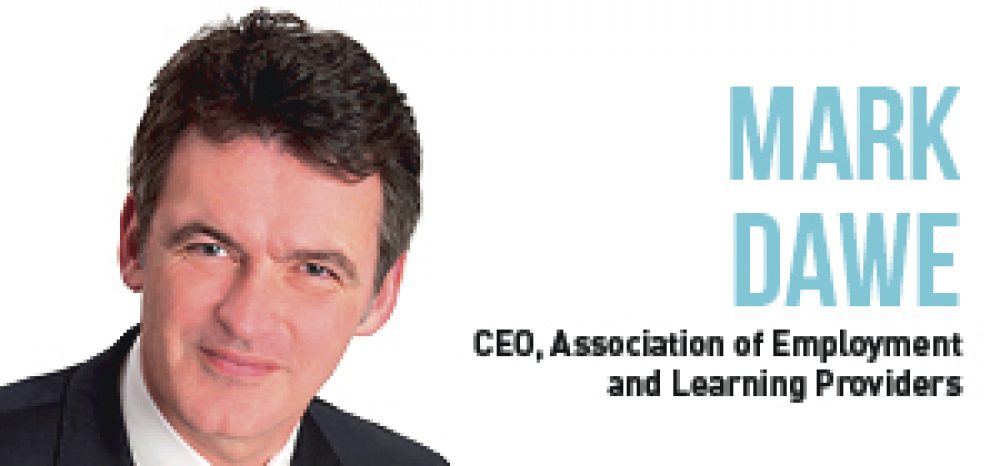Mark Dawe made his maiden speech as chief executive of AELP at last year’s Annual Apprenticeship Conference. One year on, he tackles a familiar question: are FE institutions treated fairly?
My youngest of four children, the only girl, often retorts “What about me?” when I make the mistake of saying “come on, boys”. Given my own experience in the further education sector, I really should empathise more.
I come from a background of educational privilege and I have seen what is possible. I have also run an exam board working with nearly every school in the country, while in various roles in FE I worked closely with schools and universities. I have witnessed the political priorities in what was the original all-encompassing DfES. Here is what I’ve learned.
There is inequity in the education system
Despite positive noises about skills and extra money in last week’s budget, I don’t think anyone can deny that while all public services are suffering at the moment, further education gets a tougher deal compared with schools and universities.
The sector has every right to shout and scream on behalf of the young people and adults it tries to support
And this disparity has a direct knock-on effect for learners. FE has some of the most challenging learners and is the engine for social mobility and productivity.
While it’s increasingly recognised, resources don’t follow rhetoric – I am sure I don’t need to go into the funding per learner in HE or schools compared to FE – and the sector has every right to shout and scream on behalf of the young people and adults it tries to support.
In many ways the Brexit vote represented a proportion of the population who didn’t feel like they had a voice – something we have said in FE for decades. Maybe if ministers, secretaries of state and prime ministers paid a little more attention to the FE sector, they would have a better understanding of the mood – and challenges – of the nation.
There is inequity within FE
Some people accuse me of being anti-college, but this couldn’t be further from the truth. Working in colleges for over 12 years, I have represented them regionally and nationally. I was principal of the first college to join what was then ALP – they understood how to engage with employers and I wanted to learn how. Moreover, many of the issues were common to all providers and I thought we should be campaigning side by side.
I am a cheerleader for the FE sector as a whole. I hate ‘Cinderella’, ‘second chance’, ‘safety net’ and the many other labels the sector has been given and still uses itself. With the apprenticeship policy and the technical and professional proposals, we can see a genuine light at the end of the reputation tunnel.
However, I also hate injustice, and as much as there is inequity of treatment between FE and HE and schools, inequity also exists within the sector.
Namely, independent training providers and colleges are treated differently.
In some cases, this may be justified – especially when their functions and purposes are different – but there are also cases I shall outline below, where the inequity feels like nothing more than bias.

Terminations
The government’s approach to colleges and ITPs is very different. Take the recent demise of First4Skills, closed down almost overnight primarily because of a grade four from Ofsted, resulting in an abrupt end to their Skills Funding Agency contract.
While I hold to my conviction that ‘inadequate’ provision does not deserve new starts, the owner of First4Skills is a grade three (previously grade four) college that continued to get funding for new starts despite a damning letter from the minister over four months ago. If ever there were a situation to open a wound and then rub handfuls of salt into it, this has to be it.
Bailouts
The government made clear in its apprenticeship register rules that a college with a grade four could continue to recruit apprentices if its apprenticeship provision was at a better grade, but gave no such leeway to the non-college sector.
Colleges didn’t have to demonstrate financial security; non-colleges did, despite the message that colleges would be allowed to go bust.
Capital funding
The ITP sector has never ever had capital funding or any kind of capital support yet colleges have. ITPs are not getting grants for consultancy to set up apprenticeship companies, joint ventures, etc – while colleges are. While this is not technically state aid (we checked), it is the closest yet.
Subcontracting
The news is nearly always about subcontractors going bust, or lack of control over the subcontractor, but it is those doing the subcontracting that need to be challenged. The prime contractor is responsible for monitoring the quality and financial stability of those they work with.
Bad subcontracting is a consequence of a clunky funding system, where the money is not going to the providers that can do the job and there is no willingness to redistribute funds once allocated – in many cases allowing large management fees for no management, which is totally unacceptable.
Good subcontracting and proper partnerships are great for the sector. Dishing out money while retaining a margin is simply bad practice.
Adult funding
Over 90 per cent of adult education is now grant-funded to colleges and local authority providers – with only £110 million put out to tender. To add insult to injury, colleges are able to compete with ITPs for their paltry slice of funds.
This isn’t going to remain static; we have the continued pressure of austerity and the looming implementation of devolution. Surely combined authorities will see that a greater proportion of the budget should be commissioned?
However, it seems this may be stymied in the name of financial stability for colleges; we are already hearing local authorities complain that the DfE readiness conditions include a requirement not to destabilise the college sector.
Let’s be honest about the biases
In short, there is an underlying bias in favour of colleges. If this is what the government wants, let’s at least be honest about it. Let’s have colleges as public assets and provide them the support they need to survive in their current form.
There is an underlying bias in favour of colleges
However if they are independent, let the many good colleges flourish, while those that fail can wither and die.
Fundamentally, some key decisions have to be made about what we want our colleges to be. My view is that large monolithic institutions delivering skills development away from the workplace doesn’t work.
Just listen to the voice of apprentices and employers articulating the benefits of being embedded in the workplace and supported while in a job. Large educational establishments scare many of the learners we are trying to reach.
We need to speak for those who don’t have a voice
When we argue for fair funding, it should be for FE and its students. Funding should follow the learner and be the same no matter who is delivering it.
I sometimes wonder (conspiracy theory warning) whether there is a deliberate plan to cause friction within the sector, so we forget the problems caused by government for the learners we are all striving to serve.
We all need to fight the elitist viewpoint that level two is low quality and doesn’t deserve to underpin an apprenticeship, fight the view that academic assessment is good therefore everything has to be externally examined, no matter what skills and competencies are being developed and tested.
The schools fairer funding campaign is getting lots of media attention, and HE fees almost brought down a government; but ripping out 16-18 apprenticeship funding and disadvantage funding, for example, was barely noticed outside the FE sector.
We have to speak up for those young people and adults with the quietest voices, and we need to purge the biases that lead to inefficiencies and poor delivery, and encourage everyone in the system to play to their strengths.
Colleges and ITPs have different strengths
Many colleges agree ITPs are far better at engaging with employers: colleges are not structured to respond in the flexible ways employers expect. They suffer from their own bureaucracy, which stifles their chances of proper employer engagement.
Colleges have incredible resources for full-time learning, but local niche organisations are often better at community work.
Some colleges are excellent at meeting the agenda, but generally the further the apprenticeship delivery unit is from the college systems, management, KPIs and processes and the more they are left alone, the more successful they are.
Each part of the FE sector has its own strengths – the sooner we recognise this, the sooner we will all be able to focus on those strengths and work collaboratively.









Your thoughts